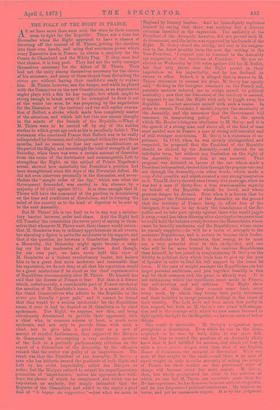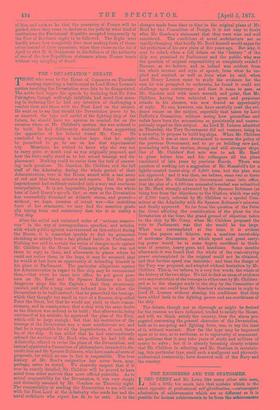THE FOLLY OF THE RIGHT IN FRANCE.
AS we have more than once said, the stars in their courses seem to fight for the Republic. There was a time last
November when the Right appeared to have a chance of throwing off the control of M. Thiers, getting the elections into their own hands, and using that enormous power which every Executive has in France, to obtain a majority for the Comte de Chambord and the White Flag. If they once had that chance, it is long past. They had not the unity amongst
themselves necessary for the defeat of M. Thiers. They had not the unity among themselves necessary for the choice of his successor, and many of them shrank from disturbing the status quo without having their candidate ready to replace him. M. Thiers, however, saw the danger, and while he played with the Committee on the new Constitution, as an experienced angler plays with a fish he has caught, but which might be strong enough to break away if he attempted to draw it out of the water too soon, lie was preparing, by the negotiation for the liberation of the territory and the still earlier evacua- tion of Belfort, a stroke which made him completely master of the situation, and which left but this one uneasy thought in the minds of the 'friends of the Republic,—What if M. Thiers were to be carried off by any of the sudden strokes to which great age such as his is peculiarly liable ? The statesman who convinced France that Belfort was to be really relinquished by Germany, and relinquished within the next three months, had no reason to fear any more machinations on thepart of the Right, and accordingly the trial of strength of last Saturday, when there was even a certain amount of desertion from the ranks of the doctrinaire and unmanageable Left to strengthen the Right, on the subject of Prince Napoleon's arrest, showed how materially the President's position had been strengthened since the days of the November defeat. He did not even intervene personally in the discussion, and never- theless the "simple order of the day," which was what the Government demanded, was carried in his absence by a majority of 56 (347 against 291). It, is clear enough that M. Thiers will have the command of the position in determining on the time and conditions of dissolution, and in forming the mind of the country as to the kind of deputies to be sent up to the next Assembly.
But M. Thiers' life is too frail to be in any way a satisfac- tory barrier between order and chaos. And the Right had till Tuesday the consolation (however poor) of saying to them- selves that whenever M. Thiers went, their chance would return ; that M. Gambetta was, to ordinary apprehensions at all events, too alarming a figure to unite the moderates in his support, and that if the question lay between a Gambettist Republic and a Monarchy, the Monarchy might again become a rally- ing cry for the moderates of all parties. And though, for our own part, we have never held this view of M. Gambetta as a violent revolutionary leader, but believe him to be a great deal more moderate and reasonable than his reputation, we do not deny at all that his reputation would be a great misfortune if he stood as the chief representative of Republican statesmanship after M. Thiers. He himself has said that the disease of France is fear. But that is a disease which, unfortunately, a considerable part of France catches at the mention of M. Gambetta's name. It is a name at which the timid Conservatives who adhere to the Republic as the status quo literally "grow pale," and it cannot be denied that that would be a serious misfortune for the Republican cause, if ever it had to depend on M. Gambetta as its chief spokesman. The Right, we suppose, saw this, and being chivalrously determined to provide their opponents with a chief who, in common esteem at least, is much more moderate, and not only to provide them with such a chief, but to give him a good start as a sort of martyr of royalist factiousness, they supported the Marquis de Graminont in interrupting a very moderate member of the Left in a perfectly parliamentary criticism on the report of a Committee of the Assembly, by the offensive remark that the orator was guilty of an impertinence. The result was that the President of the Assembly, M. Grevy, a man who has hitherto earned the gratitude of both Right and Left by his strict impartiality, called the Marquis to order; but the Marquis refused to retract his unparliamentary *ecusation of impertinence,' unless his opponent first with- - trew the phrase of which he complained, and which was no imputation on anybody, bat simply intimated that the Reporter of the Committee had added to the report a good deal of "le bagage du rapporteur,"—just what we mean in England by literary lumber. And he humedigely explained himself by saying that there was nothing but a literary criticism intended in the expression. The authorhy of the President of the Assembly, however, did not prevail with M. de Grammont, and the latter was supported by his friends of the Right. M. Grevy closed the sitting, and sent in his resigna- tion in the driest possible form the next day, writing to the Vice-President, "I request you to transmit to the Assembly my resignation of the functions of President." He was re- elected on Wednesday by 349 votes against 231 for M. Buffet, but that only shows that the Right persist in their imputation on his impartiality, and he has declined to return to office. Indeed, it is alleged that in answer to M. Thiers' entreaties to resume his place, M. Gre:xy has openly said, "So long as the foreigner remained on the French soil, patriotic motives induced me to resign myself to political neutrality ; now that the liberation of the territory is assured,
it appears to me that the Right wish only to juggle away the Republic. I cannot associate myself with such a course. In order to remain President, I should require the unanimity of the Assembly, and the assurance that the Government will
-renounce its temporising policy." Such is the speech which Mr. Reuter's telegram attributes to M. Grevy, and it is the speech of a strong man, and above all, of the kind of man most needed now in France, a man of strong self-restraint and of still stronger convictions. M. Grevy is a statesman of ex- perience. In 1848, when he was already distinguished and respected, he proposed that the President of the Republic should be elected by the Assembly,—and elected for an indefinite term, but without any limitation on the right of the Assembly to remove him at any moment. That proposal was defeated in favour of the one which made a President independent, elected him through the popular vote and not through the Assembly,—in other words, which made a coup deka possible, and which created a very strong temptation to it. Thus M. Grevy showed even twenty-five years ago, when he was but a man of thirty-five, a true statesmanlike sagacity on behalf of the Republic which he loved, and whose greatest danger he divined. Now, when it is known that he has resigned the Presidency of the Assembly, on the ground that the territory of France being in effect free of the foreigner, it is time to lay firmly the foundations of the Re- public and to take part openly against those who would juggle it away,—and has taken thisstep after showing for two years that he could hold the balance evenly between the Monarchists, whose cause he heartily condemns, and the Republicans, whose cause he warmly supports,—he will be a tower of strength to the moderate Republicans, and is certain to become their leader. It is creditable to M. Gambetta, that seeing, as he must see, a very powerful rival in this ex-Speaker, and one who will be far more trusted by the cautious Republicans than himself, he has joined in congratulating M. Grevy on the fidelity to political duty which leads him to give up the post of Speaker in order to lend his full support to the cause he loves. If the men of weight amongst the Republicans can but forget personal ambitions, and join together heartily in this way for their common end, the game is already won. It is not enthusiasm which the republican cause needs in France, but self-devotion and self oblivion. The Right show so little of this, that they commit some fresh error every week, by which they betray their party bitterness and their inability to merge personal feelings in the cause of their country. The Left have not been much less guilty in this respect, but both in M. Grevy's two years' self-abnega- tion and in the courage with which he now comes forward to fight openly the fight for theRepublic, we have an omen of better things.
One result is inevitable. M. Grevy's resignation must precipitate a dissolution. Even while he was in the chair, respected as he was by both sides, it was most diffi- cult for him to control the passions of an Assembly which knew that it had fulfilled its mission, and which yet feartd, with a tiutor morti8 deeper even than that of our English House of Commons, the moment of dissolution. With any man of less weight in the chair,—and there is no man of equal weight to take it,—the necessity of asking the people of France for their verdict on this provisional state, of things will become every day more urgent. M. Grevy, then, has wisely precipitated the crisis to the solution of which no one but M. Thiers can contribute more than he. He has experience, he has firmness, lie is not without eloquence, and he has deep-rooted political convictions. He inspires no terror, and yet he commands respect. It is by the judgment
of him and such. as he that the peasantry of France will be guided, when they come to declare at the polls by what kind of institutions the Provisional Republic accepted temporarily by the Pact of Bordeaux ought to be followed. The Right were hardly aware how completely they were making fools of them- selves instead of their opponents, when they chose on the 1st of April to abet M. de Grammont in his defiance of the authority of one of the few Republican statesmen whom France trusts without any mingling of dread.



































 Previous page
Previous page